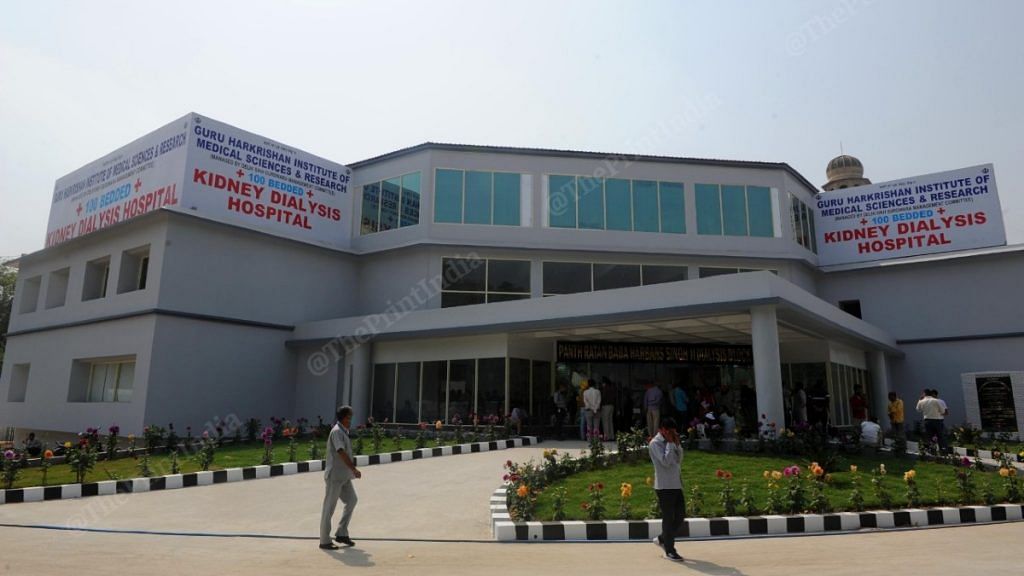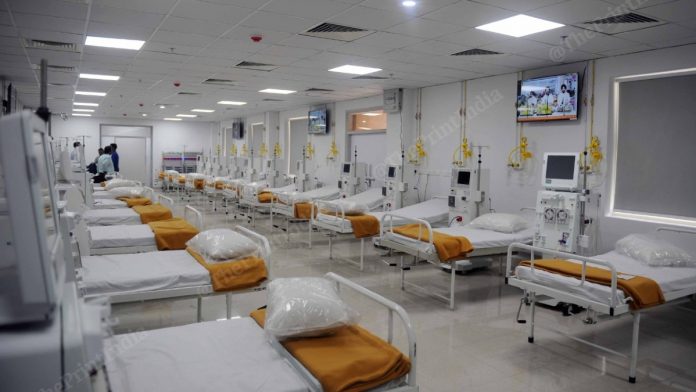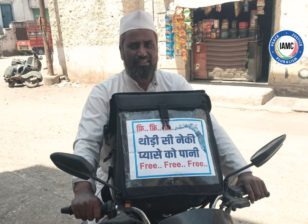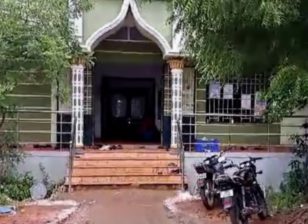With 100 beds, no billing counter, free dialysis centre at Delhi gurdwara sees people line up
The Delhi Gurdwara Sikh Management Committee which built the 100-bed dialysis facility, claims it is India’s biggest dialysis centre.
New Delhi: The Guru Harkrishan Institute of Medical Sciences and Research’s new block at Delhi’s Gurdwara Bala Sahib was teeming with people Tuesday as the facility threw its doors open for those seeking free dialysis treatment.
Built by the Delhi Sikh Gurdwara Management Committee (DSGMC), the 100-bed dialysis centre at the gurdwara in Sarai Kale Khan is being touted as India’s biggest dialysis centre.
“So the idea behind this is that more than 30 per cent of kidney patients don’t have any access to the medical facilities, either they are so poor or they have sold every asset to cover this cost,” said DSGMC president Manjinder Singh Sirsa.
He added: “The concept of the hospital is that we will not charge any money from the patients. There are many people who are coming out with the contributions, there are people who feel that humans should be served, there are corporate houses who are coming forward … funding it from CSR, so yes we will take all that and won’t charge from patients.”
The facility had received over 1,500 registrations until Tuesday afternoon.
Prescribed for patients with kidney problems, dialysis is a process of filtering and purifying the blood using machines. According to the Union health ministry, about 2.2 lakh people are diagnosed with end-stage kidney disease in India every year, “resulting in additional demand for 3.4 crore dialysis” sessions.
“With approximately 4950 dialysis centres, largely in the private sector in India, the demand is less than half met with existing infrastructure. Since every dialysis has an additional expenditure tag of about Rs.2000, it results in a monthly expenditure for patients to the tune of Rs.3-4 lakhs annually,” the ministry has said in a document about the National Dialysis Program that was started in 2016.
‘No billing counter’
Vinod Kumar, a 44-year-old resident of Faridabad in Haryana, has been undergoing dialysis for the last eight years. Each session, he said, would cost him Rs 1,500 with the monthly cost culminating up to Rs 20,000 to Rs 22,000.
The treatment became especially unbearable after Kumar lost his job during the Covid-19 pandemic.
“I am unemployed and my father is taking on all the costs. He is retired. So he is doing all of this with his pension,” he said, adding: “The moment I heard about this centre, I came here to see what facilities they have here … This money can be spent on something else now.”

The Guru Harkrishan Institute of Medical Sciences and Research at Delhi’s Gurdwara Bala Sahib where the Delhi Sikh Gurdwara Management Committee has set up a free dialysis centre | Photo: Suraj Singh Bisht
Lata Sardana shared a similar story. A resident of Delhi, she came seeking treatment for her husband at the facility after learning about it from WhatsApp forwards and news shows.
“My husband is now retired, we don’t have so much money. We would spend around Rs 50,000 per month. That’s why we have come here. There are new machines here as well,” she said.
Dr Venkatesh R, medical director at the hospital, told ThePrint: “This is an extension of Guru Harkrishan Hospital, which has one consultant, a team of three nephrologists, an ICU, an operation theatre… (apart from that) we have around 90 technicians to cater to 100 patients at a time, so we are running round the clock.”
About the registration process, he said the patients will need to furnish their medical records that will be scanned and sent to nephrologists at hospitals.
“They will give advice on how to go about it. And there is no question of showing Aadhaar card or any other document (to avail the facility). There’s no billing counter to pay the registration money over there,” he added.
The DSGMC, he said, will also bear the cost of the injections — hormone erythropoietin, for example — that are administered after a dialysis session.
Plans to expand
According to Sirsa, the committee also has plans to expand the 100-bed facility to a 1,000-bed facility, to make it “the biggest of its kind in the world”.
The current facility that is being housed in the Panth Ratan Baba Harbans Singh Ki Dialysis Block took over one and a half years to build. “Soon you will see the second phase starting here and in a couple of months we will achieve the target,” he said.
In the second phase, the DSGMC has plans to acquire 500 more machines of German make, over and above the 100 that the facility has.
The committee is also setting up a diagnostics centre at the famous Gurdwara Bangla Sahib that promises to provide MRI scans and ultrasound for a very nominal cost. The diagnostics centre at the 50-year-old Guru Harkrishan Polyclinic Bangla Sahib is likely to be opened soon.
This news first appeared in The Print




